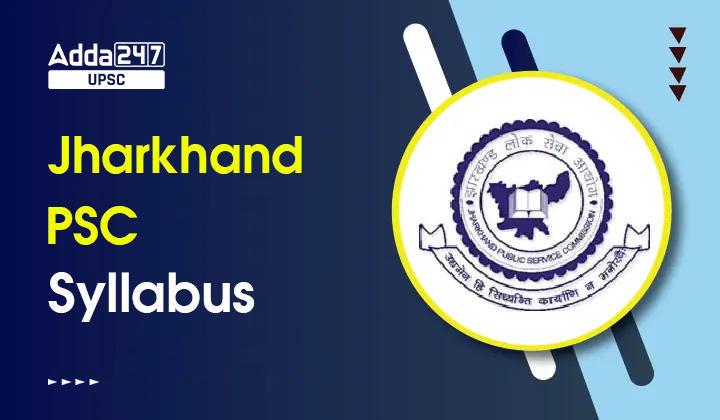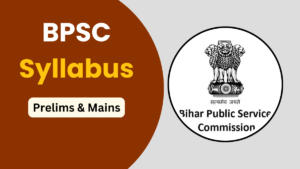Table of Contents
The JPSC Syllabus 2024 is being published by the Jharkhand Public Service Commission. To improve their preparation, candidates are advised to carefully and systematically go over the JPSC Syllabus. Easy and convenient sessions of studying are made possible by getting access to the JPSC syllabus. Furthermore, it is essential to understand the JPSC exam pattern because it offers an understanding of the expected question styles for the JPSC Exam.
JPSC Syllabus 2024
The Jharkhand PCS notification was made available on the official website of the Jharkhand Public Service Commission. You can apply online for JPSC recruitment if you wish to take the Jharkhand Civil Service Examination. The notification includes the JPSC Syllabus 2024, which outlines the topics that you must study for the examination. The JPSC CSE Syllabus will become clearer to you after reading this article.
- The JPSC Exam Pattern for the Combined Civil Service Exam consists of three stages: Prelims, Mains, and Interview.
- The Prelims stage consists of two multiple-choice papers, each with a maximum of 200 marks.
- Six descriptive-style papers make up the main stage, and each paper is required.
- The Interview carries 100 marks.
JPSC Prelims Syllabus
here candidates will get the breakdown of the JPSC Prelims Exam Syllabus, which is important for those candidates who want to work as civil officers in Jharkhand, It covers a wide range of topics, including general studies topics and current affairs. Additionally, candidates can improve their analytical skills in the JPSC Exam.
JPSC Prelims Syllabus for General Studies Paper-I
Understand the JPSC Preims Syllabus for General Studies -1 topics preparation. In the following points, the candidate can read the whole syllabus.
- History of India (Ancient India, Medieval India, Modern India)
- Geography of India (General Geography, Physical Geography, Economical Geography, Social & Demographic Geography)
- Indian Polity and Governance (Constitution of India, Public Administration and Good Governance, Decentralization: Panchayats & Municipalities)
- Economic and Sustainable Development (Basic features of the Indian Economy, Sustainable Development and Economic issues,
- Economic Reforms and Globalization)
- Science and Technology (General Science, Agriculture & Technology Development, Information & Communication Technology)
- Questions specific to Jharkhand (General Awareness of its History, Society, Culture, and Heritage)
- National and International Current Events
- General Question of Miscellaneous (Human Rights, Environmental protection, Biodiversity & Climate change, Urbanization,
- Sports, Disaster Management, Poverty and unemployment, Awards, United Nations and other International Agencies)
JPSC Prelims Syllabus for General Studies Paper-II
- History of Jharkhand
- Governance of Munda, Nagvanshi, Padaha Panchayat, Majhi Pargana, Munda Manki, Dhoklo Sohor, Jaatiya Panchayat
- Jharkhand Movement (Tribal of Jharkhand, Freedom Fighters of Jharkhand, Nobles of Jharkhand, Jharkhand Movement and Formation of the State)
- The specialty of Jharkhand (Social status of Jharkhand, Cultural status of Jharkhand, Political situation of Jharkhand, Economic condition of Jharkhand, Religious characteristics and identity of Jharkhand)
- Culture of Jharkhand (folk literature, Traditional art and folk dance, Folk music and instruments, Places of interest – Natural, archaeological, historical, religious, and modern sites, Tribal-Caste-Species and Characteristics, Jharkhand Literature and Litterateur,
- Premier Educational Institutes of Jharkhand, Sports of Jharkhand, Land laws of Jharkhand, Chotanagpur Tenancy Act (C.N.T.), Santhal Pargana Tenancy Act (S.P.T.), Other state bills act)
- History of Economic Development in Jharkhand after 1947 and Geography of Jharkhand
- Industrial Policy, Displacement, and Rehabilitation Policy and other policies of Jharkhand
- Name and location of major industry and industrial development in Jharkhand
- Major schemes and sub-plans of Jharkhand
- Forest Management and Wildlife Conservation of Jharkhand
- Facts related to the environment of Jharkhand state, the environmental change happening and its Mitigation & Adaptation and related topics
- Disaster Management in Jharkhand
- Miscellaneous facts and current affairs related to Jharkhand
JPSC Prelims Exam Pattern
The JPSC Prelims Exam comprises of two objective-type (multiple choice question) papers. The JPSC Prelims Exam Pattern details are as follows:
| JPSC Exam Pattern for Prelims | |||||
|---|---|---|---|---|---|
| Paper | Subject | Total Marks | Total Questions | Duration | Negative Marking |
| I | General Studies-I | 200 | 100 | 2 hours | 1/3rd mark deducted for each wrong answer |
| II | General Studies-II | 200 | 100 | 2 hours | 1/3rd mark deducted for each wrong answer |
JPSC Mains Syllabus 2024
To fill a variety of public service positions in Jharkhand, the Jharkhand Public Service Commission (JPSC) conducts the Combined public Services Examination. Two of the six papers in the JPSC Mains exam are qualifying exams. This is a thorough overview of the JPSC Mains exam syllabus:
| JPSC Mains Syllabus | |
| JPSC Mains Syllabus Paper 1: General Hindi and General English(Qualifying) | Hindi
English
|
| JPSC Mains Syllabus Paper 2 (Language and Literature) | 1. Oriya Language and Literature 2. Bengali Language and Literature 3. Urdu Language and Literature 4. Sanskrit Language and Literature 5. English Language and Literature 6. Hindi Language and Literature 7. Santhali Language and Literature 8. Panchpargania Language and Literature 9. Nagpuri Language and Literature 10. Mundari Language and Literature 11. Kurux Language and Literature 12. Kurmali Language and Literature 13. Khortha Language and Literature 14. Khadia Language and Literature 15. Ho Language and Literature |
| JPSC Mains Syllabus Paper 3 (Social Sciences, History and Geography) | History: It covers the syllabus from the following topics: Ancient period Medieval Period Modern Period History of Jharkhand Geography: It covers the syllabus from the following topics: Physical Geography (General Principles) Physical and Human Geography of India Natural Resources of India: Development and Utilization Geography of Jharkhand and utilization of its resources. Population Industrial and Urban Development The pattern of Urban Settlement and Pollution problems. |
| JPSC Mains Syllabus Paper 4 (Indian Constitution, Polity, Public Administration and Good Governance) | Indian Constitution and Polity: It covers the following topics:
Public Administration and Good Governance: It covers the following topics:
|
| JPSC Mains Syllabus Paper 5 (Indian Economy, Globalization, and Sustainable Development) | Basic Features of the Indian Economy
Sustainable Development, Economic Issues, and Indian Development Strategy
Economic Reforms, Nature and Impact on the Indian Economy
The economy of Jharkhand – features, issues, challenges, strategies
|
| JPSC Mains Syllabus Paper 6 (General Sciences, Environment & Technology Development) | Physical Science:
Agriculture Science:
Environmental Science:
Science and Technology Development:
|
JPSC Syllabus 2024 PDF
The JPSC Syllabus 2024 is an important resource that describes every subject and subtopic that candidates must learn to fully prepare for the JPSC Exam. The JPSC PDF for syllabus, which can be downloaded via the official JPSC website or the above link, provides an extensive overview of the syllabus covering subjects for both the Prelims and Mains exams.
It is suggested that candidates download the Jharkhand PSC Syllabus 2024 PDF to use as a guide while they prepare for the exam. The JPSC examination covers a wide range of topics, and this guide helps applicants stay focused and organized while studying these topics.
JPSC Mains Exam Pattern
The JPSC examination structure is divided into three parts, each of which candidates must successfully check to qualify. These three stages of the examination comprise:
- The JPSC Mains Exam consists of six papers.
- Each paper has a duration of three hours.
- To qualify for the exam, candidates must score above the minimum qualifying marks and the cut-off marks.
| Paper | Subject | Duration | Marks |
| Paper I | General Hindi & General English | 3 hours | 150 |
| Paper-II | Language and Literature | 3 hours | 150 |
| Paper III | Social Sciences | 3 hours | 200 |
| Paper IV | Indian Constitution & Polity | 3 hours | 200 |
| Paper V | Indian Economy | 3 hours | 200 |
| Paper VI | General Sciences | 3 hours | 200 |
JPSC Interview Process
The final round of selection in the JPSC recruitment process is known as the Interview Process. The only candidates eligible to take part in the interview procedure are those who passed the JPSC Mains Exam. The purpose of this part is to assess the applicant’s general attitude and fitness for the position. The details of the JPSC Interview Process are provided below:
- Total Marks: The JPSC Interview carries a total of 100 marks.
- Duration: The duration of the Interview is not fixed, and it may vary depending on the number of candidates appearing for the Interview.
- Nature of the Interview: The JPSC Interview is a face-to-face Interview with the JPSC board. The Interview board comprises of subject matter experts, senior bureaucrats, and psychologists.
- Assessment Criteria: The JPSC Interview assesses the candidate’s mental alertness, social traits, interest in current affairs, intellectual capabilities, and overall suitability for the post.
- Final Selection: The final selection of the candidates is made based on the combined performance in the JPSC Mains Exam and the Interview process.
JPSC Exam Preparation Strategy
One of the most competitive exams in the country is the JPSC Exam, which is achievable only with a systematic and well-planned preparation approach. Here are some suggestions and strategies to help students in getting ready for the JPSC exam:
- Understand the Exam Pattern: The candidates should thoroughly understand the JPSC Exam Pattern and syllabus before starting their preparation. It will help them to prioritize their preparation and focus on the essential topics.
- Make a Study Plan: The candidates should make a study plan and allocate specific time for each subject and topic. A well-planned study plan will help them to cover the entire syllabus and revise it multiple times before the exam.
- Read Newspapers and Magazines: The candidates should read newspapers and magazines to stay updated with current affairs and develop a better understanding of social, economic, and political issues.
- Refer to Standard Books: The candidates should refer to standard books and study material to cover the topics in-depth. They should also make notes and revise them regularly.
- Practice Mock Tests: The candidates should practice mock tests and previous year’s question papers to get a better understanding of the exam pattern and type of questions asked. It will also help them to identify their weak areas and work on them.
- Revise Regularly: The candidates should revise the entire syllabus regularly to retain the information for a more extended period. They should also focus on their weaker areas and work on improving them.
- Stay Motivated and Positive: The JPSC Exam is challenging, and candidates should stay motivated and positive throughout their preparation. They should also take breaks and indulge in activities that they enjoy to keep their mind refreshed.



 APSC Syllabus 2025, Download Prelims And...
APSC Syllabus 2025, Download Prelims And...
 Punjab PCS Syllabus 2025, New Prelims an...
Punjab PCS Syllabus 2025, New Prelims an...
 BPSC Syllabus 2025 and Exam Pattern For ...
BPSC Syllabus 2025 and Exam Pattern For ...




